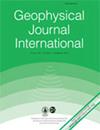斜向辐合下帕米尔腹地的 N-S 向走向滑动活动:2015 年和 2023 年地震
IF 2.8
3区 地球科学
Q2 GEOCHEMISTRY & GEOPHYSICS
引用次数: 0
摘要
摘要 突出的帕米尔高原对理解亚洲大陆碰撞造山过程具有重要意义。然而,由于帕米尔腹地自然条件恶劣,地震活动较少,我们对这一地区的了解仍然不足。最近的重大事件和大地测量观测资料的积累为我们深入了解该地区的构造活动和造山过程提供了难得的机会。首先,我们利用 Sentinel-1 和 ALOS-2 SAR 图像,获取了与 2015 年和 2023 年最新地震相关的共震位移。随后,我们利用基于有限断层模型的地表位移约束条件进行地震模型反演。结果显示,2015 年塔吉克 7.2 级地震的位移范围为-0.8 米至 0.8 米,2023 年穆尔霍布 6.9 级地震的位移范围为-0.25 米至 0.25 米。2015 年地震的最佳三段式模型显示,断层长度为 89 千米,地表断裂沿 Sarez-Karakul 断层(SKF)延伸 59 千米,主要为左侧走向滑动运动,最大滑移量为 3.5 米。分布式滑移模型表明,2023 年事件造成的断裂长度为 32 千米,导致 8 千米的地表断裂。其次,库仑应力计算表明,2023 年事件受到 2015 年事件的阻碍。最后,地震间 GPS 数据显示,帕米尔腹地沿 SKF 的 N-S 向相对运动和 E-W 向相对运动分别为 3.4-5.7 毫米/年和 3.2-3.8 毫米/年。这些北-南向的走向滑动活动和滑动行为支持了帕米尔地区正在发生的强烈剪切和延伸,这是对印度板块和欧亚板块之间斜向汇聚的反应。本文章由计算机程序翻译,如有差异,请以英文原文为准。
The N-S direction strike-slip activities in the Pamir hinterland under oblique convergence: the 2015 and 2023 earthquakes
Summary The prominent Pamir plateau holds considerable significance in comprehending the processes of Asian continental collisional orogeny. However, due to harsh natural conditions and low seismic activity within the Pamir hinterland, our understanding of this region remains deficient. Recent major events and the accumulation of geodetic observations present a rare opportunity for us to get insights into the tectonic activities and orogenic processes occurring in this region. Firstly, employing Sentinel-1 and ALOS-2 SAR images, we acquire coseismic displacements associated with the most recent earthquakes in 2015 and 2023. Subsequently, we conduct the souce models inversion with the constraints of surface displacements based on a finite-fault model. Our results reveal displacements ranging from -0.8 m to 0.8 m for the 2015 Mw 7.2 Tajik earthquake and -0.25 m to 0.25 m for the 2023 Mw 6.9 Murghob event, respectively. The optimal three-segment model for the 2015 event ruptured a fault length of 89 km with a surface rupture extending 59 km along the Sarez-Karakul fault (SKF), characterized predominantly by left-lateral strike-slip motion, with a maximum slip of 3.5 m. Meanwhile, our preferred uniform slip model suggests that the 2023 event ruptured an unmapped fault in the southern Pamir region with a strike angle of 31° and a dip angle of 76.8°. The distributed slip model indicates that the 2023 event ruptured a fault length of 32 km, resulting in an 8 km surface rupture. This event is characterized by left-lateral strike slip, with a peak slip of 2.2 m. Secondly, the Coulomb stress calculations demonstrate that the 2023 event was impeded by the 2015 event. Finally, interseismic GPS data reveals a relative motion of 3.4–5.7 mm/yr in the N-S component and 3.2–3.8 mm/yr in the E-W component along the SKF in the Pamir hinterland, respectively. These N-S direction strike-slip activities and slip behaviors support an ongoing strong shear and extension in the Pamir regime, which is a response to the oblique convergence between the Indian and Eurasian plates.
求助全文
通过发布文献求助,成功后即可免费获取论文全文。
去求助
来源期刊

Geophysical Journal International
地学-地球化学与地球物理
CiteScore
5.40
自引率
10.70%
发文量
436
审稿时长
3.3 months
期刊介绍:
Geophysical Journal International publishes top quality research papers, express letters, invited review papers and book reviews on all aspects of theoretical, computational, applied and observational geophysics.
 求助内容:
求助内容: 应助结果提醒方式:
应助结果提醒方式:


